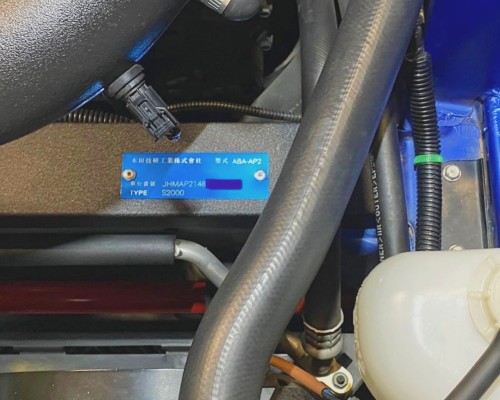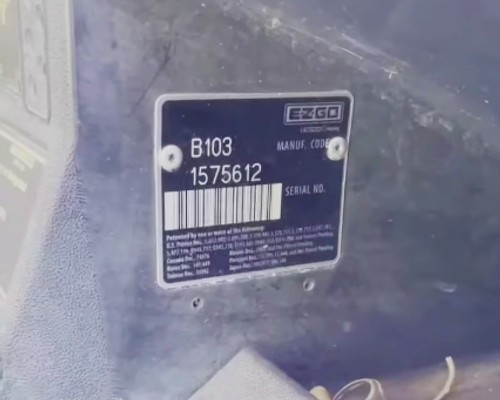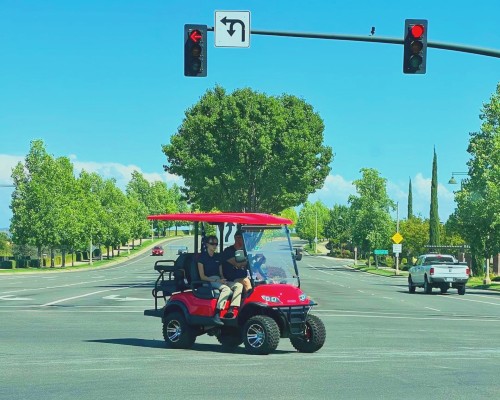Have you ever wondered if your golf cart has a VIN number, just like a car? The question might seem simple, but the answer is layered with intriguing details.

While standard golf carts don’t come with a VIN, they do have unique serial numbers assigned during manufacturing. But what if you have a custom, road-ready cart?
The world of golf cart identification is more complex than it appears, and understanding these nuances can be vital for buying, selling, or even customizing your golf cart.
Dive in to unravel the mystery behind golf cart identification and what it means for you.
What is a VIN Number and its Importance?
Every motor vehicle, upon creation, receives a distinct Vehicle Identification Number (VIN) as its signature identifier.
Originating in the United States and many other countries post-1981, the VIN is more than just a series of characters; it’s a fingerprint for vehicles.
Each VIN is a 17-character sequence containing specific information about the vehicle it’s assigned. The primary purpose of the VIN is to track various aspects of the vehicle throughout its life.
This includes registrations, recalls, thefts, and insurance claims. By doing so, it aids in preventing theft, misrepresentation, and other potentially fraudulent activities.
For consumers, the VIN provides a way to check the history of a vehicle before purchasing, ensuring they are making an informed decision.
The Structure of a VIN Number: Breaking it Down!

The VIN is meticulously structured, with each character or set of symbols representing specific information about the vehicle:
- Digit 1: Country of origin or assembly.
- Digit 2: Vehicle manufacturer.
- Digit 3: Division within the manufacturer, indicating the type of vehicle (e.g., car, truck).
- Digits 4-8: These vary among manufacturers but typically provide detailed information about the vehicle. This can include weight, horsepower, model code, body type, and engine type.
- Digit 9: A check digit, calculated using the other digits, to identify any tampering or errors quickly.
- Digit 10: Model year of the vehicle.
- Digit 11: The factory or plant where the vehicle was assembled.
- Digits 12-17: Production sequence numbers, pinpointing the specific vehicle.
While the VIN is standard for road-going vehicles, it’s essential to note that most golf carts, when manufactured, don’t come with a VIN since they aren’t initially intended for public road use. Instead, they have a serial number.
However, if one wishes to make their golf cart street-legal, obtaining a VIN becomes a necessary step.
The Difference Between VIN Numbers and Serial Numbers
VIN (Vehicle Identification Number) and Serial Numbers serve as unique identifiers for vehicles and products, respectively. However, their purposes, structures, and applications differ significantly. Here’s a tabular breakdown of their differences:
| Aspect | VIN Number | Serial Number |
|---|---|---|
| Purpose | Identifies road-worthy vehicles for legal and tracking purposes. | Identifies specific products or items, often for inventory or manufacturing tracking. |
| Structure | Typically 17 characters long, standardized format. | Varies by the manufacturer; can be alphanumeric. |
| Usage | Used for cars, trucks, motorcycles, and other vehicles intended for road use. | Used for a wide range of products, including golf carts. |
| Legal Implications | Required for vehicle registration, insurance, and road legality. | Often used for warranty claims or product recalls. |
| Information Conveyed | Provides details about the vehicle’s manufacturer, model, engine size, and year of manufacture. | Typically indicates the model and manufacturing details, but is manufacturer-specific. |
Why Do Golf Carts Come with Serial Numbers?

Golf carts, unlike regular vehicles, are not primarily designed for street use. As a result, they don’t come with VIN numbers when they leave the manufacturer. Instead, they are equipped with manufacturer-specific serial numbers. These serial numbers serve several purposes:
1. Identification: Serial numbers help identify the specific model, year of manufacture, and sometimes the factory location of the golf cart.
2. Inventory Management: Golf courses and dealerships use serial numbers to manage their inventory, ensuring they have a record of each cart in their possession.
3. Repairs and Sales: If you need to repair or sell your golf cart, providing the serial number can be essential. It helps technicians and buyers understand the cart’s history and specifications.
4. Non-Road Use: Since golf carts are primarily used on golf courses or private properties, there’s no legal requirement for them to have a VIN. The serial number suffices for their intended use.
The Process of Acquiring a VIN for Golf Carts
If you’re considering using your golf cart on public roads, it becomes essential to acquire a Vehicle Identification Number (VIN). Here’s a step-by-step guide on how to go about it:
1. Connecting with the Department of Motor Vehicles (DMV)
Before initiating any upgrades or changes to your golf cart, it’s crucial to get in touch with your local DMV. They will provide you with the necessary guidelines and requirements specific to your state or region.
The DMV is the primary authority responsible for issuing VINs and will guide you on the documentation needed, such as proof of purchase or a bill of sale.
This step ensures you’re on the right track from the beginning and helps avoid any legal complications down the road.
2. Necessary Upgrades and Inspections for Golf Carts
Once you’re clear on the DMV’s requirements, the next step involves making the necessary upgrades to your golf cart to make it street-legal. This process can vary based on regional regulations, but common upgrades include:
- Installing headlights, tail lights, and turn signals.

- Mounting exterior mirrors for better visibility.
- Adding seat belts for safety.
- Ensuring the golf cart has a windshield.
- Modifying the engine or motor to meet the minimum speed requirements for road use.
After making these upgrades, an inspection might be required to verify that the golf cart meets all road safety standards. This inspection is typically conducted by a certified professional or designated authority.
3. Registration, Licensing, and Insurance Requirements
With the upgrades and inspections complete, the final steps involve registering the golf cart, obtaining a license plate, and ensuring it’s insured.
The registration process will require the golf cart owner to provide all necessary documentation, including proof of the upgrades and the inspection certificate. Once registered, the DMV will issue a VIN, which will be unique to your golf cart.
Additionally, just like any other road-going vehicle, your golf cart will need to be insured. This not only protects you from potential liabilities but also ensures the safety of others on the road.
Benefits of Having a VIN for Your Golf Cart
1. Resale Value
Golf carts with a VIN, indicating they are road-ready, can potentially have a higher resale value. Buyers often prefer carts that are already equipped for road use, saving them the hassle of upgrades and registration.
2. Theft Prevention and Tracking
A VIN (Vehicle Identification Number) is a unique identifier that can be used to track registrations, recalls, thefts, and claims. This system helps deter theft, misrepresentation, and other crimes, ensuring that your golf cart remains secure.
3. Enhanced Identification
While all golf carts come with a manufacturer’s serial number, a VIN provides a more detailed and standardized identification system. Each character in the 17-character VIN sequence corresponds to specific data points about the vehicle, such as its origin, manufacturer, model, and production history.
4. Road Legality

If you intend to use your golf cart on public roads, a VIN is mandatory. It signifies that the golf cart meets the necessary standards and regulations to be deemed road-worthy. This transition from a recreational vehicle to a road-ready one requires the golf cart to have a VIN.
5. Insurance and Licensing
With a VIN, you can obtain insurance for your golf cart and get it licensed for road use. This is essential for ensuring that you’re covered in case of accidents or damages while driving on public roads.
6. Universal Tracking
The VIN system is universally recognized, allowing for easy tracking and identification of vehicles, including golf carts. This is especially useful if you’re buying or selling a golf cart, as the VIN provides a clear history of the vehicle.
7. Safety and Compliance
Acquiring a VIN means that your golf cart has undergone necessary inspections and meets the safety standards set by the Department of Transportation. This ensures that your golf cart is equipped with essential features like proper lights, and seat belts, and meets speed requirements for safe road use.
Final Thoughts!
In the realm of vehicular identification, while cars and other road vehicles have standardized VIN numbers, golf carts tread a unique path. Typically, golf carts are equipped with manufacturer’s serial numbers, not VINs, as they’re primarily designed for off-road use.
However, the landscape changes when one wishes to make their golf cart street-legal. In such cases, a VIN becomes essential, offering benefits like theft prevention, enhanced identification, and ensuring road legality.
To succinctly answer the central question: No, regular golf carts do not come with VIN numbers, but they require one if intended for public road use. This distinction is crucial for safety, compliance, and the broader utility of the golf cart.
FAQs!
Where is the VIN number on golf carts?
The VIN number on golf carts, when present, is typically located on the frame. For many golf carts, especially those from popular manufacturers like Club Car, EZGO, and Yamaha, the VIN or serial number can be found under the glove box, on the frame’s cross member, or near the rear wheel well.
However, the exact location can vary based on the make and model of the golf cart. If intending to make a golf cart street-legal and it doesn’t have a VIN, one must be obtained from the Department of Transportation.
Always refer to the manufacturer’s manual or website for specific location details.
Do Yamaha golf carts have a VIN?
No, Yamaha golf carts do not come with a VIN (Vehicle Identification Number) by default, as they are primarily designed for off-road use.
However, if a Yamaha golf cart is modified or intended for street-legal use on public roads, it may require a VIN, depending on local regulations.
Instead of a VIN, Yamaha golf carts typically have a manufacturer’s serial number for identification purposes.

Meet Edward Green, the founder of GolfingGoal and a seasoned expert in golf. With years of experience on the course and a passion for the sport, Edward has a wealth of knowledge to share. As our Lead Writer, he contributes articles, tutorials, and resources to help readers to improve their skills and reach their full potential on the golf course. Join Our Team!
